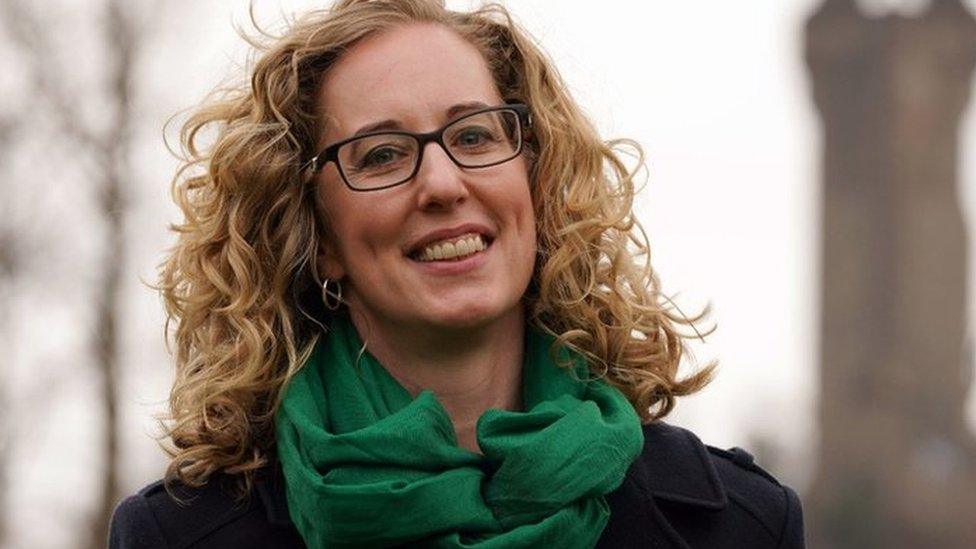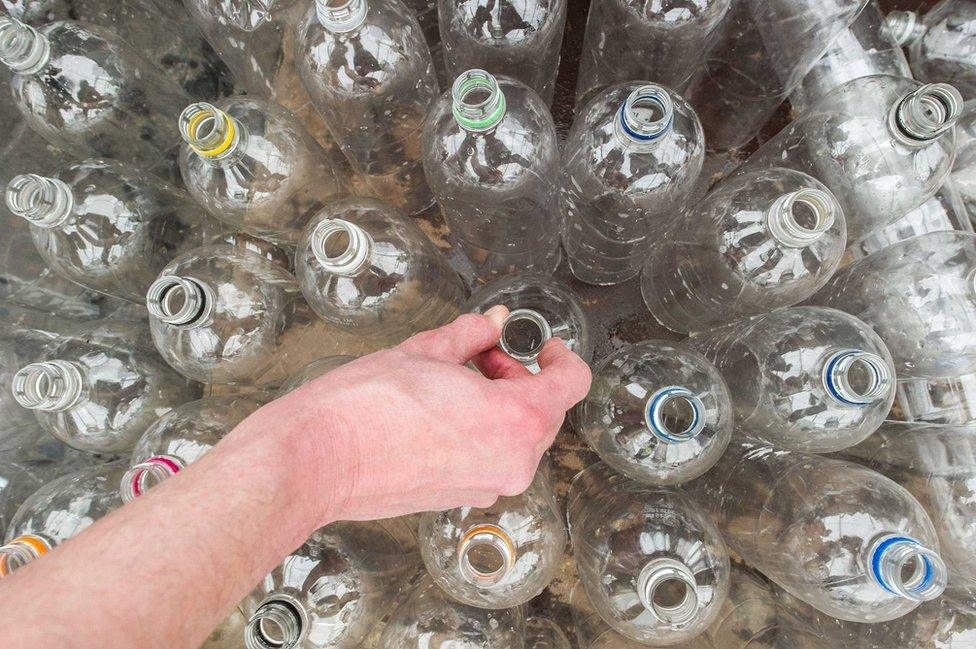Minister Lorna Slater remains firm on bottle return scheme date
- Published

Scottish Greens co-leader and Scottish government minister Lorna Slater says businesses are backing the scheme
The minister responsible for Scotland's bottle return scheme has insisted launch day will remain 16 August.
Lorna Slater said it would be a "kick in the teeth" for businesses if the project was delayed further.
Drink producers wanting to sell in Scotland from mid-August have until midnight on Tuesday to register.
However, the Scottish Conservatives have called for an independent inquiry into the scheme which will see a 20p charge on drinks in cans or bottles.
That deposit will be returned to the customer when the containers are brought back for recycling.
Circular Economy Minister Ms Slater told BBC Radio Scotland's Good Morning Scotland programme that a grace period for smaller producers was being considered.
However, she added: "No-one with any credibility to support business in Scotland would delay the scheme any further because those businesses that have made that substantial investment, shops that have got their planning permission for their reverse vending machines - they don't get that return on that investment until those 20 pences start flowing."
Pressed about what would happen if businesses failed to register by Tuesday's deadline, she said they would "in principle not be able to sell in the Scottish market".
She said small businesses worried they were not fully compliant with the scheme would be supported by Sepa and scheme administrator Circularity Scotland.
'Proportionate approach to compliance'
First Minister Nicola Sturgeon later said she would "strongly encourage" drinks producers to register with Circularity Scotland, as the "best way to make sure that their products can be sold without issue in Scotland".
She added: "I also want to reassure drinks producers with concerns about the impact of the scheme.
"Sepa has made clear that they will take a proportionate approach to compliance. They will work with businesses to help them get ready - advice and guidance, not fines, will be the first step for any business that is clearly taking action but struggling to meet their obligations."

Scottish businesses have been set a deadline to sign up for the recycling initiative
Producers will have a legal responsibility for the collection and management of drinks containers covered by the scheme.
But industry figures have warned it could impose potentially catastrophic costs on their businesses.
All three SNP contenders to replace Nicola Sturgeon as first minister have raised concerns about the scheme in its current form.
'Not fit for purpose'
The Scottish Tories have called for an emergency statement to clear up the many "unanswered" questions.
Tory MSP Maurice Golden said: "It should never have got to the stage where, on the eve of the deadline, key questions about the scheme remain unanswered - such as, will there be a grace period for small producers and, if so, what is a 'small producer'? But, astonishingly, that's where we are.
"This could be cataclysmic for the firms affected. It's no exaggeration to say there are 24 hours to save Scottish businesses."
He added: "We all support the principle behind the DRS but in its current form it's not fit for purpose and risks signalling the death knell for Scottish businesses, which face being burdened with unsustainable costs."


When the SNP and the Scottish Greens struck a deal to share power in August 2021, the two parties papered over some fundamental differences. , external
Excluded from their agreement was the concept of "economic growth" which the SNP has placed at the heart of its prospectus for independence, external but which the Greens have decried as "a relic of outdated economic thinking that is driving the destruction of the planet". , external
Now these two incompatible philosophies have come together with all the grace of a bin full of glass bottles being emptied into the back of a recycling lorry.
The Greens see the deposit return scheme as a means to shift responsibility for the consequences of capitalism from the state to business, from taxpayers to shareholders, from consumers to the owners of capital.
But even if you support that approach — and many in the SNP do not — the project has also run into a string of practical problems with confusion and anger about the costs for small firms in particular.
Plus there is the potential impact on cross-border trade with England, both now and if different return schemes are eventually introduced elsewhere in the UK.
That has provoked another constitutional row, with the UK government making noises about blocking the project.
It may not need to. All three SNP leadership contenders have, to some extent, trashed the original plan.
Kate Forbes says it could cause "economic carnage"; Ash Regan wants it to be redesigned or scrapped; Humza Yousaf supports a grace period for small firms.
Which means that, one way or the other, the deposit return scheme as originally designed looks set for the bin — the question is: will the co-operation agreement between the SNP and Greens end up there with it?


Circularity Scotland recently announced £22m of support to remove upfront charges from some companies.
However, many small businesses in particular have expressed concern about the scheme as it stands.
Peter Sherry, owner of Edinburgh-based beer and wine merchant The Beerhive, told BBC Scotland: "The trade as a whole are behind the idea of a scheme that would work, but in its current form it is disastrous, not just on a financial level.
"We haven't even got to the logistics yet and the nitty-gritty details that need to be worked out."

Mr Sherry described the scheme in its current form as "disastrous"
At least one England-based drinks distributor said his company had withdrawn its beer and cider from the Scottish markets as a result of the scheme, although it would continue to sell spirits north of the border.
Chris Jones, managing director of Manchester-based Paragon Brands, said the scheme created "a huge amount of complications" for his business.
"We've had to take a decision to withdraw a couple of products from the Scottish market simply because of the viability of them there and the cost it would put on our business to continue with them. We can't commercially make it work."
Scottish Secretary Alister Jack has hinted that the UK government might not agree to a UK Internal Market Act exemption for the scheme.
The UK government said that following any decision it would be up to the Scottish government whether to proceed with the scheme or not.
A UK government spokesman said: "The Scottish secretary has urged the Scottish government to pause its scheme and work with the UK government on a solution that works for both Scotland and the whole of the UK.
"That would be the best way to maximise environmental benefits, minimise disruption to the drinks industry and ensure choice for consumers."